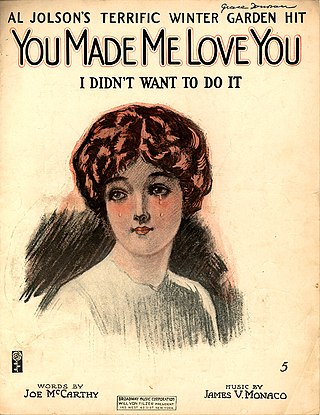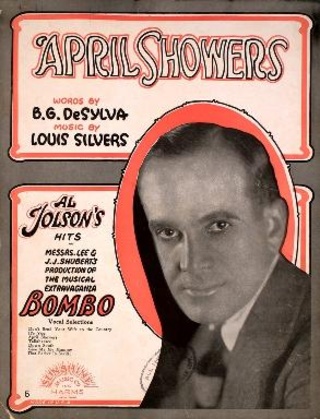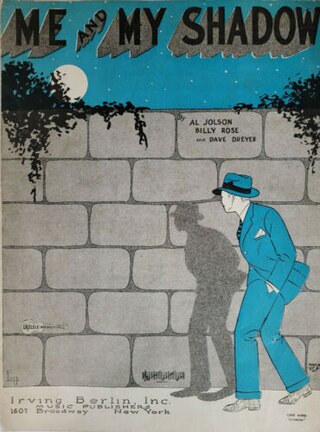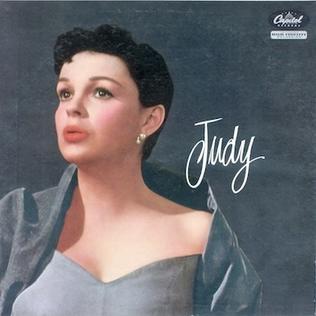Related Research Articles

George Gard "Buddy" DeSylva was an American songwriter, film producer and record executive. He wrote or co-wrote many popular songs and, along with Johnny Mercer and Glenn Wallichs, he co-founded Capitol Records.

The Singing Fool is a 1928 American musical drama part-talkie motion picture directed by Lloyd Bacon which was released by Warner Bros. The film stars Al Jolson and is a follow-up to his previous film, The Jazz Singer. It is credited with helping to cement the popularity of American films of both sound and the musical genre.
"Come Rain or Come Shine" is a popular music song, with music by Harold Arlen and lyrics by Johnny Mercer. It was written for the Broadway musical St. Louis Woman, which opened on March 30, 1946, and closed after 113 performances.
"In the Wee Small Hours of the Morning" is a 1955 popular song composed by David Mann, with lyrics by Bob Hilliard. It was introduced as the title track of Frank Sinatra's 1955 album In the Wee Small Hours.

Claus Ogerman was a German arranger, conductor, and composer best known for his work with Billie Holiday, Antonio Carlos Jobim, Frank Sinatra, Michael Brecker, and Diana Krall.

"My Buddy" is a popular song with music written by Walter Donaldson, and lyrics by Gus Kahn. The song was published in 1922 and early popular versions were by Henry Burr (1922), Ernest Hare (1923) and Ben Bernie.

"You Made Me Love You (I Didn't Want to Do It)" is a popular song from 1913 composed by James V. Monaco with lyrics by Joseph McCarthy. It was introduced by Al Jolson in the Broadway revue The Honeymoon Express (1913), and used in the 1973 revival of the musical Irene.

"I'm Sitting on Top of the World" is a popular song with music written by Ray Henderson and lyrics by Sam M. Lewis and Joe Young. It was published in 1925.

"Chicago" is a popular song written by Fred Fisher and published in 1922. The original sheet music variously spelled the title "Todd'ling" or "Toddling." The song has been recorded by many artists, but the best-known versions are by Frank Sinatra, Ben Selvin and Judy Garland. The song alludes to the city's colorful past, feigning "... the surprise of my life / I saw a man dancing with his own wife", mentioning evangelist Billy Sunday as having not been able to "shut down" the city, and State Street where "they do things they don't do on Broadway".

"April Showers" is a 1921 popular song composed by Louis Silvers with lyrics by B. G. De Sylva.

Duets is a compilation album by American singer Barbra Streisand, released on November 26, 2002, by Columbia Records. The collection features nineteen duets from Streisand's career, including two newly recorded ones: "I Won't Be the One to Let Go" with Barry Manilow and "All I Know of Love" with Josh Groban. The Manilow duet was released as the album's lead single on November 4, 2002, as a streaming-only exclusive for AOL Music website members.
"Get Happy" is a song composed by Harold Arlen, with lyrics written by Ted Koehler. It was the first song they wrote together, and was introduced by Ruth Etting in The Nine-Fifteen Revue in 1930. The song expresses the gospel music theme of getting happy, an expression of religious ecstasy for salvation.

"Me and My Shadow" is a 1927 popular song. Officially the credits show it as written by Al Jolson, Billy Rose, and Dave Dreyer, with Jolson and Dreyer being shown on the sheet music as being responsible for the music and Rose the lyrics. Al Jolson was often given credits on sheet music so he could earn more money by popularizing them, but he played no actual part in writing this song. Jolson never recorded the song although he did use it in the touring version of "Big Boy" in 1927.
"Old Devil Moon" is a popular song composed by Burton Lane with lyrics by Yip Harburg for the 1947 musical Finian's Rainbow. It was introduced by Ella Logan and Donald Richards in the Broadway show. The song takes its title from a phrase in "Fun to Be Fooled", a song that Harburg wrote with Harold Arlen and Ira Gershwin for the 1934 musical Life Begins at 8:40.

"I'm Always Chasing Rainbows" is a popular Vaudeville song. The music is credited to Harry Carroll, but the melody is adapted from Fantaisie-Impromptu by Frédéric Chopin. The lyrics were written by Joseph McCarthy, and the song was published in 1917. It was introduced in the Broadway show Oh, Look! which opened in March 1918. The song was sung in the show by the Dolly Sisters. Judy Garland sang it in the 1941 film Ziegfeld Girl. It was subsequently sung by Jack Oakie in the 1944 film The Merry Monahans and was again featured in the 1945 film The Dolly Sisters, where it was sung by John Payne. It was also included for part of the run of the 1973 revival of Irene. Additionally, the pre-chorus would not have been included until later covers in the 1940´s, where the song would gain it´s iconic libretti

"Alabamy Bound" is a Tin Pan Alley tune written in 1924, with music by Ray Henderson and words by Buddy DeSylva and Bud Green. It was popularized by Al Jolson and included in the musical Kid Boots, where it was sung by Eddie Cantor. Successful recordings of the song were released in 1925 by Paul Whiteman, Isham Jones and Fletcher Henderson (instrumentals), as well as Blossom Seeley, whose vocal version reached number 2 on the charts. The song has sold over a million copies of sheet music and has been included in several films over the years.
"Sonny Boy" is a song written by Ray Henderson, Buddy De Sylva, and Lew Brown. It was featured in the 1928 part-talkie The Singing Fool. Sung by Al Jolson, the 1928 recording was a hit and stayed at #1 for 12 weeks in the charts and was a million seller.
Liza (All the Clouds'll Roll Away)" is a song composed by George Gershwin with lyrics by Ira Gershwin and Gus Kahn. It was introduced in 1929 by Ruby Keeler (as Dixie Dugan) in Florenz Ziegfeld's musical Show Girl. The stage performances were accompanied by the Duke Ellington Orchestra. On the show's opening night in Boston on June 25, 1929, Keeler's husband and popular singer Al Jolson suddenly stood up from his seat in the third row and sang a chorus of the song, much to the surprise of the audience and Gershwin himself. Jolson recorded the song a few days later on July 6, 1929, and his rendition rose to number nine on the charts of the day.

Judy is a 1956 studio album by Judy Garland, her second LP on the Capitol label, arranged by Nelson Riddle.
"The Best Things in Life Are Free" is a popular song written by the songwriting team of Buddy DeSylva and Lew Brown (lyrics) and Ray Henderson (music) for the 1927 musical Good News. It enjoyed a revival during the period from 1947 to 1950, when it was covered by many artists.
References
- ↑ Stanley Green Encyclopedia of the Musical Theatre Page 99 078674684X - 2009 "The first DeSylva-Brown-Henderson song was "It All Depends on You" for Big Boy, and their first score was for George White's Scandals of 1925. For the next year's edition, they had two hits: "Lucky Day" and "The Birth of the Blues.
- ↑ "45cat.com". 45cat.com. Retrieved December 30, 2018.